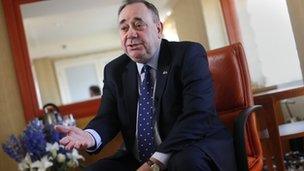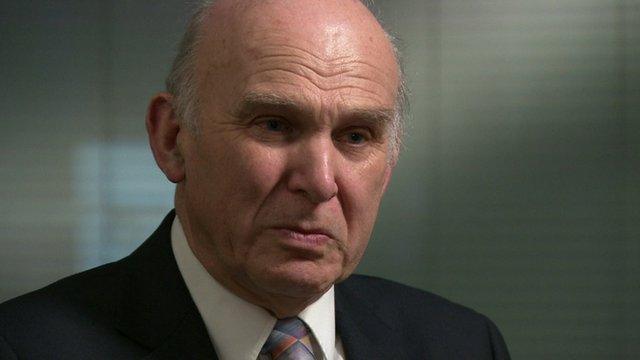Scottish independence: Growth pains or pleasures?
- Published

The Scottish government wants Scotland to keep the pound
It's arguably the most important economic question in Scotland's independent referendum. No, not the choice of currency, nor the future path of oil revenues.
It's the question of what would happen to economic growth. Or to put a bit more simply: would Scotland be better or worse off if it were independent?
At least one serious survey suggested that could be the decisive factor for many voters. So could Scotland grow faster if it were a nimbler, smaller country? And allied to that: what extra hidden costs might there be, for instance in a premium interest rate for smaller countries' debts?
The Economic and Social Research Council is putting some of our finest minds on the case. It's spending at least £4m on researching Scotland's relationship with the United Kingdom, with or without independence.
And on Thursday at a conference in Edinburgh, it presented some of its work, and worked through some of the challenges, even though much of this remains work-in-progress.
Heteroskedasticity
An academic paper presented by Birmingham University economist Professor Peter Sinclair was unusually entertaining by the standards of the dismal science. And that's despite the sentence: "Logarithmic specifications work best, and help to deal with heteroskedasticity".
The essay at least pointed towards some answers to the key question. But frustratingly, as with so much of the debate, it could only point. Answers are elusive.
The prof had looked at countries that have been through a split, to see what happened to their growth rates afterwards. The initial findings from such precedents as Czechoslavakia, Yugoslavia and the USSR suggest there can be a very deep decline in economic output, at least in the short term, just as there can be a sharp rise in economic output in the longer term.
And the biggest recent example of two countries uniting - East and West Germany - points towards big costs and subdued growth.
But in every case he could find of countries splitting, there were so many other factors at play - notably the impact of ending central economic planning controls by Communist Party officials, and even moreso the impact of war - makes them all but meaningless as a guide to Scotland's possible futures.
Too many cooks?
So how about the question of the optimum size of country for economic growth? Is it true that small countries grow faster, or that size holds them back?
Or as Professor Sinclair put it: "Do too many cooks spoil the broth, or do many hands make light work?"
Well, the conference heard that Scotland's population of five million people would put it mid-table in the league of nations. So it may not even count as a small country, but as a median-sized one.

Alex Salmond can expect to meet a formidable defence over economic UK interests
However, Prof Sinclair found it hard to conclude much more than that. He found average economic growth is a little bit higher for the smallest countries than it is for those slightly larger. Small countries include some very rich tax havens, oil-rich sheikhdoms and city hubs.
And, it was pointed out, that could be true of Shetland, or even prosperous enclaves within Scottish cities.
But as you get up to bigger countries still, growth picks up again, until you get to the very biggest countries, by which time it's slightly lower again.
Represented graphically, it's a saucer shape as you go up the size scale, followed by a hump as you get to the biggest countries. But there's not that much variation for either. It's a shallow saucer and a small hump.
So if that's any guide, Scots could be better off if split into council areas, or at least, some could. Or alternatively, Scotland could be better off than it is if it were part of a much bigger state than the UK.
But of course, it's not much of a guide. And the international context of this was spelled out bluntly - that growth rates in the UK, Scotland, much of Europe and much of what we used to consider 'the rich, or developed world' is facing a long period of subdued growth. That's not only as the debt burden unwinds, but as fast-growing nations succeed in winning work from us, and catch up on our income levels.
"Get used to 1% growth, if you're lucky - 1.5% ceiling," declared Prof Sinclair, of Scotland's post-referendum prospects. "That's it - in or out" (by which I think he meant '...of the UK').
Bond baddie
What, then, about the international experience of the cost of borrowing? Stand by for an answer, with numbers attached.
The argument is that smaller countries can borrow, but there's a premium placed on the risk that it may be hard to offload sovereign bonds. That is, bonds issued by the UK and other large countries are regularly and easily traded, but that's not so for smaller countries, and the risk of finding it hard to find a buyer puts a premium on price.
The calculation leaves aside the lack of any credit history. Nor does it take into account the Scottish government's proposal that Scotland should use the pound, but at least majority control of its monetary policy should be in London. Credit rating agencies mark down countries in that position.
It finds that a sovereign Scotland would probably - once it starts to issue its own bonds, rather than honouring a share of the UK Treasury's recent bond issues - have to pay an extra 0.4% to 0.6% on its borrowing. "And if things went badly, possibly much more," argues Prof Sinclair.
Indeed, there may be little spread of risk between countries for much of the time, but there are spikes of spreads between different countries, as we've seen in the eurozone in the past four years. That's when things become very hard to manage.
So here's the crunch: what would 0.55% extra mean, on top of the 1.68% at which Treasury 10-year bonds were trading today?
If you assume Scotland taking on a £120bn share of UK debt projecting forward to 2016, then Professor Sinclair gives us the conclusion that it would build up to an additional cost of £111 per person per year, or £289 for the average family.
'Desperate for clarity'
Among the conference's other significant insights: the tax base of an independent Scotland, or other small countries open to cross-border migration of income and assets, may have to focus ever more on items that can't be moved, such as buildings and land.
That might make you wonder: whatever happened to the idea of a local income tax replacing buildings-based council tax?
And the consensus of academics doing the talking, particularly in light of experience in Quebec, is that next year's referendum is not the end point of the debate, but the start of a negotiation as to what independence actually means.
There were sharp criticisms of the UK government for refusing to spell out its positions on how to handle Scotland and relations with the rest of the UK after a 'yes' vote. One contributor pointed out that the 'decide first, then negotiate' is starkly at odds with the Downing Street approach to reform on the European Union: 'negotiate everything first, and then decide'.
"This stance prohibits informed decision-making by an electorate desperate for clarity, and merits closer scrutiny," according to Dr Nicola McEwan, an ESRC fellow at Edinburgh University. "The 2015 General Election raises questions over who would be in government to oversee independence negotiations, but it doesn't prevent the UK parties from being challenged to make their positions clear."
Different approach
You'll recall that George Osborne departed from that script last week, when he set out the negotiating stance of the rest of the UK on sharing the pound sterling as a post-independence currency, along with oversight and central banking by the Bank of England.
He may have been blustering, as Alex Salmond claimed, ahead of taking a very different approach after a 'yes' vote. But at least the Chancellor offered a reminder that Mr Salmond's negotiation team can expect to meet a formidable defence of the economic interests of the rest of the UK.
With that exception - its authenticity disputed - Whitehall is leaving much of the rest of its thinking deliberately vague. So the view from the ESRC conference was that the result of the vote may be merely a mandate to negotiate, and the strength or weakness of the result may contribute to shaping the outcome of those talks.
While both 'yes' and 'no' camps may want a definitive result to put an end to debate, those taking an impartial position as academic observers reckon that it may merely be the starting point for a new phase.
- Published1 May 2013
